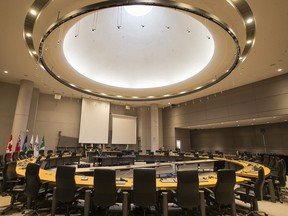The LRT report isn't the biggest problem; the fact that the mayor, council and staff make it hard for the public get meaningful information is.

The report of the public inquiry into Ottawa’s LRT fiasco certainly made for great headlines, with its claims of “malfeasance” and “egregious violations of public trust.”
The problem is the standards implied by the commissioner’s comments. In Justice William Hourigan’s world, politicians, bureaucrats and even corporations should be expected to tell the truth, the whole truth and nothing but the truth at all times, always placing the public interest above their own.
Sign up to receive daily headline news from Ottawa Citizen, a division of Postmedia Network Inc.
Thanks for signing up!
A welcome email is on its way. If you don't see it, please check your junk folder.
The next issue of Ottawa Citizen Headline News will soon be in your inbox.
It’s a nice idea, but it is difficult to imagine where, in the course of human history, such conditions have existed. One certainly won’t find them in our federal or provincial legislatures, where spin and obfuscation are the norm.
By the standards of our senior levels of government, the actions of former mayor Jim Watson and senior city staff barely qualify as misdemeanours. In his report, Hourigan is harshly critical of former city manager Steve Kanellakos for not giving councillors the full story about the difficulties involved in meeting the city’s reliability standards during the trial runs of the new train.
Here are the shocking details: On Kanellakos’s authority, the city accepted 96 per cent average dependability for the best nine of 12 days of train-running trials, rather than the perhaps unrealistic 98 per cent reliability for 12 consecutive days that the city had agreed to in 2019. The 96 per cent standard was what had been initially accepted by the city in 2017.
According to the commission report, failure to share this information “prevented councillors from fulfilling their statutory duties to the people of Ottawa.” What, exactly, would councillors have done with the missing information? The widely shared desire was to get the trains in operation, not find new reasons to hold up the long-delayed start of service.
The commissioner is also critical of the fact that key information was known only to Watson, Kanellakos, former transportation general manager John Manconi, and then-transit commission chair Coun. Allan Hubley. As the city’s lawyers pointed out, that’s normal operating procedure in the municipal sector. As mayor and committee chair, Watson and Hubley would normally receive more information than their council colleagues.
The work of the rest of council was essentially done when they approved the LRT plan and its budget, then delegated implementation authority to Kanellakos.
Hourigan does criticize the major international corporations that failed to deliver a reliable system according to schedule, which is the main problem, but he reserves most of his venom for city politicians and staff.
While Hourigan’s criticisms of the Watson way of doing things are arguably off-base in this particular instance, there is a secrecy and control problem that was outside the scope of the commissioner’s work.
When Watson became mayor in 2010, the nature of city government here changed fundamentally. During his time in provincial politics, Watson appeared to develop a penchant for message control and spin.
The city budget was transformed into a meaningless mass of numbers, rather than an annual accounting of what the public was getting for its money. Performance reporting became mostly a thing of the past, especially in regard to OC Transpo and the state of the city’s assets.
It used to be possible for the media to interview senior city staffers about issues and projects on which they were the experts. That has been replaced by a system of emailed questions that eventually produce a statement attributable to someone, but which are frequently non-responsive to the actual questions.
In short, under Watson the public was told what he wanted it to know, and nothing more.
Senior city staff were willing to go along with the culture of secrecy and information control because it made their jobs easier. Councillors could have demanded more information, but they rarely did, for the same reason.
That’s the real scandal of the Watson regime at city hall, not the LRT situation, where both staff and politicians did their best to resolve a problem that was largely not of their making and beyond their ability to control.
Randall Denley is an Ottawa political commentator and author. Contact him at randalldenley1@gmail.com


